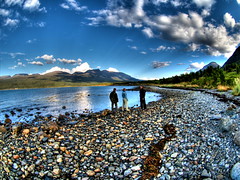Hitched a ride with some kind Amsterdam hackers and made it home from Berlin after another wonderful visit. Before leaving I got to spend some more time with both Mitch Altman who brought you the TV-B-Gone, and Emmanuel of 2600. I recorded podcasts with both of them, and during our conversations we did come back to the topic which I raised at the conference, the Arctic Cold War.
Currently I’m looking more into Canada’s role and their plan for the part of the arctic that they claim. What is often referred to as the Northwest Passage, is the route that goes right over Canada and could make for a good connection between the Atlantic and the Pacific, because of the fast melting of the arctic ice. Canada claims that the Northwest Passage is their sovereign territory, despite the fact that part of it is in the arctic which is supposed to be international territory. They also reject claims from nations, such as the US, that say it is an international crossing or an international straight, and can therefore not be considered property of Canada.
Why does this matter so much? As I said in my talk, among the reasons, the destruction of the planet hangs in the balance. Nations like Russia, Canada, and even the US, have mobilized military resources and dedicated money for new military forces to patrol, oversee, and be positioned in the arctic to show some kind of control or claim over territory. Canada itself has carried out excercises and dedicated a military force that, according to the prime minister, will defend Canada’s sovereign territory in the arctic. Note the term – DEFEND!
As I explore Canada’s military statements and websites, there is an odd mix of friendliness and willingness to use the military is this game to gain control of the arctic. I’m gathering a few military videos and statistics on their activities and will put them out in a video entry shortly. But one thing is already clear, there is something very disturbing when nations not only try to claim what is supposed to be international territory that has such great importance to the future of the planet, but when they also use weapons and soldiers in some twisted effort to support that claim by exhibiting a willingness to use deadly force.
 He does what? – People often ask whenever I mention Lewis Gordon Pugh. He swims the arctic, I tell them again. Why? – is always the next question.
He does what? – People often ask whenever I mention Lewis Gordon Pugh. He swims the arctic, I tell them again. Why? – is always the next question. “Do you fear an arms race over the arctic?” the host of The Current Podcast asked an Inuit representative during a recent episode. The gentlemen spoke at length about the problems of the Inuit population in the high arctic and his concerns about the Canadian federal government doing military exercises in the arctic as opposed to giving much needed attention to public services and infrastructure.
“Do you fear an arms race over the arctic?” the host of The Current Podcast asked an Inuit representative during a recent episode. The gentlemen spoke at length about the problems of the Inuit population in the high arctic and his concerns about the Canadian federal government doing military exercises in the arctic as opposed to giving much needed attention to public services and infrastructure. My good friend and fellow personal publisher Raymond
My good friend and fellow personal publisher Raymond